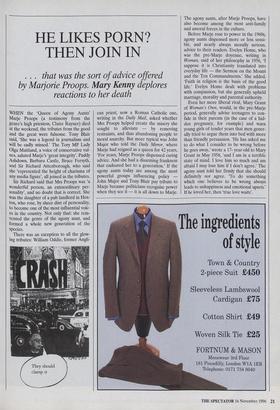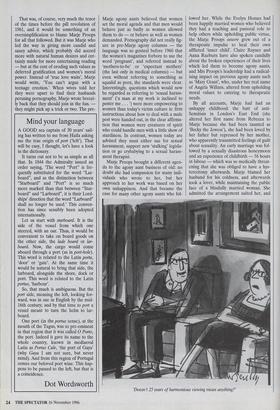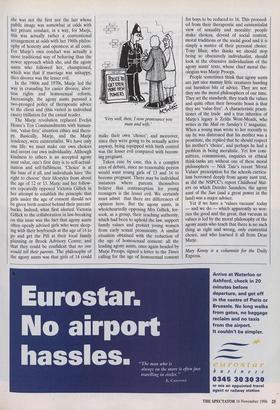HE LIKES PORN?
THEN JOIN IN
. . . that was the sort of advice offered
by Marjorie Proops. Mary Kenny deplores
reactions to her death
WHEN the 'Queen of Agony Aunts' Marje Proops (a testimony from the genre's high priestess, Claire Rayner) died at the weekend, the tributes from the good and the great were fulsome. Tony Blair said, 'She was a legend in journalism and will be sadly missed.' The Tory MP Lady Olga Maitland, a voice of conservative val- ues, saluted Marje's 'great integrity'. Paddy Ashdown, Barbara Castle, Bruce Forsyth, and Sir Richard Attenborough, who said she 'represented the height of charisma of any media figure', all joined in the tributes.
Sir Richard said that Mrs Proops was 'a wonderful person, an extraordinary per- sonality', and no doubt that is correct. She was the daughter of a pub landlord in Hox- ton, who rose, by sheer dint of personality, to become one of the most influential voic- es in the country. Not only that: she rein- vented the genre of the agony aunt, and formed a whole new generation of the species.
There was an exception to all the glow- ing tributes: William Oddie, former Angli-
can priest, now a Roman Catholic one, writing in the Daily Mail, asked whether Mrs Proops helped create the misery she sought to alleviate — by removing restraints, and thus abandoning people to moral anarchy. But more typical was John Major who told the Daily Mirror, where Marje had reigned as a queen for 42 years, `For years, Marje Proops dispensed caring advice. And she had a disarming frankness that endeared her to a generation.' If the agony aunts today are among the most powerful groups influencing policy John Major and Tony Blair pay tribute to Marje because politicians recognise power when they see it — it is all down to Marje.
The agony aunts, after Marje Proops, have also become among the most anti-family and amoral forces in the culture.
Before Marje rose to power in the 1960s, agony aunts dispensed more or less sensi- ble, and nearly always morally serious, advice to their readers. Evelyn Home, who was the pre-Marje doyenne, writing in Woman, said of her philosophy in 1956, 'I suppose it is Christianity translated into everyday life — the Sermon on the Mount and the Ten Commandments.' She added, `Faith in religion is the basis of the good life.' Evelyn Home dealt with problems with compassion, but she generally upheld marriage, morality and parental authority.
Even her more liberal rival, Mary Grant of Woman's Own, would, in the pre-Marje period, generally advise teenagers to con- fide in their parents (in the case of a hid- den pregnancy, for example) and warn young girls of tender years that men gener- ally tried to argue them into bed with more than friendly persuasion. 'He has asked me to do what I consider to be wrong before he goes away,' wrote a 17- year-old to Mary Grant in May 1956, 'and I am in a terrible state of mind. I love him so much and am afraid I may lose him if I don't agree.' The agony aunt told her firmly that she should definitely not agree. `To do something which one believes to be wrong always leads to unhappiness and emotional upsets.' If he loved her, then 'true love waits'. That was, of course, very much the tenor of the times before the pill revolution of 1961, and it would be something of an oversimplification to blame Marje Proops for all that followed. But it was Marje who led the way in giving more candid and saucy advice, which probably did accord more with natural human desires and cer- tainly made for more entertaining reading — but at the cost of eroding such values as deferred gratification and women's moral power, Instead of 'true love waits', Marie would write, 'You can't argue with a teenage erection.' When wives told her they were upset to find their husbands perusing pornography, Marje wrote breezi- ly back that they should join in the fun. — they might pick up a trick or two. The pre- Marje agony aunts believed that women set the moral agenda and that men would behave just as badly as women allowed them to do — or behave as well as women demanded. Pornography did not really fig- ure in pre-Marje agony columns — the language was so genteel before 1960 that the women's magazines forbore to use the word 'pregnant', and referred instead to `mothers-to-be' or 'expectant mothers' (the last only in medical columns) — but even without referring to something as squalid as porn, the standards were clear. Interestingly, questions which would now be regarded as referring to 'sexual harass- ment' ('a man at my work is inclined to pester me . . . ') were more empowering to women than today's victim culture is: firm instructions about how to deal with a male pest were handed out, in the clear affirma- tion that women were creatures of spirit who could handle men with a little show of sturdiness. In contrast, women today are advised they must either sue for sexual harassment, support new `stalking' legisla- tion or go crybabying to a sexual harass- ment therapist.
Marje Proops brought a different agen- da to the agony aunt business of old: no doubt she had compassion for many indi- viduals who wrote to her, but her approach to her work was based on her own unhappiness. And that became the case for many other agony aunts who fol- lowed her. While the Evelyn Homes had been happily married women who believed they had a teaching and pastoral role to help others while upholding public virtue, the Marje Proops oeuvre grew out of a therapeutic impulse to heal their own afflicted 'inner child'. Claire Rayner and Anna Raeburn have also spoken candidly about the broken experiences of their lives which led them to become agony aunts, and Mrs Proops's leadership had a radical- ising impact on previous agony aunts such as 'Mary Grant', who, under her real name of Angela Willans, altered from upholding moral values to catering to therapeutic needs.
By all accounts, Marje had had an unhappy childhood: the butt of anti- Semitism in London's East End (she altered her first name from Rebecca to Marje because she had been taunted as Becky the Jewess'), she had been loved by her father but repressed by her mother, who apparently transmitted feelings of guilt about sexuality. An early marriage was fol- lowed by a sexually disastrous honeymoon and an experience of childbirth — 56 hours in labour — which was so medically threat- ening that she was obliged to have a hys- terectomy afterwards. Marje blamed her husband for his coldness, and afterwards took a lover, while maintaining the public face of a blissfully married woman. She admitted the arrangement suited her, and 'Doesn't 25 years of harmonious viewing mean anything?' she was not the first nor the last whose public image was somewhat at odds with her private conduct; in a way, for Marje, this was actually rather a conventional arrangement at odds with her 1960s philos- ophy of honesty and openness at all costs. For Marje's own conduct was actually a more traditional way of behaving than the newer approach which she, and the agony aunts who followed her, championed, which was that if marriage was unhappy, then divorce was the lesser evil.
In the 1960s and 1970s, Marje led the way in crusading for easier divorce, abor- tion rights and homosexual reform. Increasingly, the agony aunts pursued a two-pronged policy of therapeutic advice to the client and (this varied in individual cases) titillation for the casual reader.
The Marje revolution replaced Evelyn Home's Ten Commandments with human- ism, 'value-free' situation ethics and thera- py. Basically, Marje, and the Marje tendency, were existentialist. We have only one life: we must make our own choices and invent our own individuality. Although kindness to others is an accepted agony aunt value, one's first duty is to self-actual- isation and self-fulfilment. 'Choice' is at the base of it all, and individuals have 'the right to choose' their lifestyles from about the age of 12 or 13. Marje and her follow- ers repeatedly opposed Victoria Gillick in her attempt to establish the principle that girls under the age of consent should not be given birth control behind their parents' backs. Indeed, what first alerted Victoria Gillick to the collaboration in law-breaking on this issue was the fact that agony aunts often openly advised girls who were sleep- ing with their boyfriends at the age of 14 to go and get the Pill at their local family planning or Brook Advisory Centre; and that they could be confident that no one would tell their parents. The philosophy of the agony aunts was that girls of 14 could Very well, then, I now pronounce you man and wife.'
make their own `choice'; and moreover, since they were going to be sexually active anyway, being equipped with birth control was the lesser evil compared with becom- ing pregnant.
Taken case by case, this is a complex area of debate, since no reasonable person would want young girls of 13 and 14 to become pregnant. There may be individual instances where parents themselves believe that contraception for young teenagers is the lesser evil. We certainly must admit that there are differences of opinion here. But the agony aunts, in wholeheartedly opposing Mrs Gillick, for- sook, as a group, their teaching authority, which had been to uphold the law, support family values and protect young women from early sexual promiscuity. A similar situation obtained with the reduction of the age of homosexual consent: all the leading agony aunts, once again headed by Marje Proops, signed a letter to the Times calling for the age of homosexual consent for boys to be reduced to 16. This proceed- ed from their therapeutic and existentialist view of sexuality and morality: people make choices, devoid of social context, moral traditions or the social good and it is simply a matter of their personal choice. Tony Blair, who thinks we should stop being so obsessively individualist, should look at the obsessive individualism of the agony aunts' texts, whose chief moral the- ologian was Marje Proops.
People sometimes think that agony aunts are just nice mumsy little creatures handing out harmless bits of advice. They are not: they are the moral philosophers of our time. They set the standards, they teach the values and quite often their favourite boast is that they are 'value-free'. A characteristic practi- tioner of the trade and a true inheritor of Marje's legacy is Zelda West-Meads, who writes in the Mail on Sunday's U magazine. When a young man wrote to her recently to say he was distressed that his mother was a prostitute, she replied that he should respect his mother's 'choice', and perhaps he had a problem in being moralistic. Yet few com- mittees, commissions, enquiries or ethical think-tanks are without one of these moral philosophers — Nick Tate's recent 'Moral Values' prescription for the schools curricu- lum borrowed deeply from agony aunt text, as did the NSPCC's report Childhood Mat- ters on which Deirdre Saunders, the agony aunt of the Sun (and a great power in the land) was a major adviser.
Yet if we have a 'values vacuum' today — and we do — which apparently so wor- ries the good and the great, that vacuum in values is led by the moral philosophy of the agony aunts who teach that there is no such thing as right and wrong, only existential choice, and who learned it all from Dear Marje.
Mary Kenny is a columnist for the Daily Express.




















































































 Previous page
Previous page